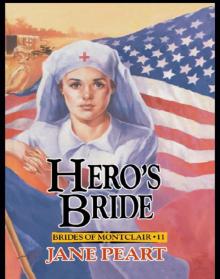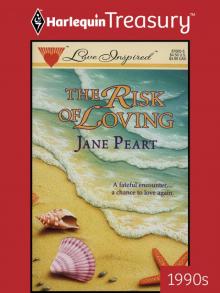- Home
- Jane Peart
Courageous Bride Page 2
Courageous Bride Read online
Page 2
Cara smiled wistfully in the dark. “God bless them both tonight, wherever they are.” She closed Niki’s door and Luc’s as well. It was going to be a long summer.
chapter
2
Dear Tante and Uncle Kip,
Luc saw me into a taxi at the Gare du Nord, and he had to run to catch his own train to Provence. The bustle at the station was unbelievable. The porters shouting, the noise, the sooty smell, the honking of the cabs lined up at the curb. Everyone speaking French fast and loud. I could only catch a few sentences, phrases here and there. I didn’t realize my French was so poor. I hope it will come back. After all, it was my first language—surely it will come back? I handed the driver the card with the name of the pension Aunt Kitty recommended, and we arrived safely.
Love,
Niki
Aunt Kitty had given Niki a small leather-bound notebook of blank pages, telling her, “You must keep a journal. Put down your impressions, a few words even, so when you get home, you can read it over and relive all those marvelous moments.”
Niki had thanked her but had not thought she would use it very much. Aunt Kitty was a writer, so she always thought in terms of words.
Niki was usually too busy living whatever she was doing rather than writing about it. However, much to her surprise, when she got to France she found herself so filled with an emotional response to all she was seeing, things she knew she would want to remember, that she began to carry the little book with her, jotting down impressions on the spot. It also became a place where at the end of the day she wrote honestly about things she would never put in a letter home. Although she tried to write home at least once a week, there were many things she was thinking and feeling that might hurt Cara. She was beginning to be aware of the sense of being French, and her desire to seek some information about her parents had increased.
In her journal she wrote,
I am in Paris. After writing those words, I can hardly believe it! A dream come true, a hope realized. I walk the streets wondering how my real mother felt. Am I seeing what she saw, feeling what she felt? Did she fall in love here? Will I?
For Niki everything was stimulating about Paris. She felt free, enormously happy here—as if she belonged. Even as she explored the streets, the byways, the little shops and the sidewalk cafes, all had a familiarity, as if she knew them from somewhere—in her bones, in her blood. Everything was here for her to discover; there was no veil over the past, nothing mysterious or hidden.
She tried to capture the essence of her experience in her letters and journal entries:
Ma chere Tante (I’m practicing writing in French!),
My room is very nice—up steep steps, almost to the top of the house. I am sitting at a table looking out my window at the roofs and chimneys. From here I can see a small strip of gray that must be the Seine in the very far distance. I must explore everything. Today I am going to the Louvre. Au revoir—for now. More later.
Always,
Niki
I awake early, the gray, pink dawn rising over the city. I feel like I’m awakening not from a dream but into one. I am really here. The place of my birth and all those early unremembered years. I must go out and find myself.
I must celebrate, treat myself to something special. A Parisian bonnet, of course. Everyone must have a hat from Paris! I saw one that I admired in a milliner’s shop the other day; now I think I must have it. It is hardly more than a scrap of feathers and a tiny nose veil. It is “enchante,” the salesperson declares. And I agree. I’ve never seen anything so ridiculous-looking. I’ll probably give it to Scotty Cameron when I get home. She would love it and love to brag about having a hat from Paris to her snooty friends at boarding school, n’est ce pas? Meanwhile I shall wear it and enjoy my new image. Perhaps I’ll wear it to attend High Mass at the Cathedral of Notre Dame, or something equally formal and appropriate.
Ma chere Tante,
What a wonderful surprise I had early yesterday morning. Luc showed up at the pension with Paul Duval! I hadn’t seen him, of course, since the winter he spent with us at Montclair. He is much more handsome, sophisticated, than he was then. Maybe Frenchmen mature sooner than Americans. Anyway, Madame Genvieve, the concierge here, gave both of these tanned, good-looking “vagabonds” a severe look when they asked for me (Luc imitated her suspicious frown for me later), and when I came running downstairs, flung myself into Luc’s arms, she almost fainted. I laughingly explained, “C’est mon frere” several times before she beamed a big smile and bustled about to serve them fresh coffee and croissants.
We had a marvelous day, the three of us. At noon in Paris everything stops. Shop doors post signs declaring they will be back in two hours, shutters are closed, bookstalls fold up. All along the riverbank Parisians relax, taking a leisurely lunch hour. We decided to join them. We bought loaves of the delicious bread they make here every day (I shall find it hard to eat ordinary bread ever again!), chunks of cheese, luscious peaches, and grapes for a picnic, and Paul bought a bottle of wine. Now, don’t worry, Tante, I did not drink any. But for Paul, a Frenchman, it is the accepted thing. He says French children are weaned on it. Of course, I don’t believe that for a minute. Or much of any of the other things Paul declared as fact when I asked him for some suggestions as to becoming more acclimated. I’m afraid half of what he tells me will get me into difficulties. He is a terrible tease—but also terribly charming. Luc looks on all this banter between us with indulgent good humor. Their plan is to go on to Holland, where they hope to find jobs as waiters and continue their bicycle trip through the Netherlands. It sounds so exciting. I wish I could go along. I hinted at the possibility but both of them ignored me. It is irritating to still be treated sometimes as an annoying little sister. Inside I feel very grown-up.
I still have Paris to discover, and although I hated for our day together to end, I saw them off the next day without feeling too bad. I will see them both at the end of the summer. In the meantime, today I am going back to the Louvre. Does anyone ever get enough ofthat?
chapter
3
Paris
NIKI’S HEART WAS THRUMMING as the taxi stopped with a jerk in front of the gray, stone building behind tall, black iron gates. On a metal plaque was engraved Les Soeurs de Merci. Niki thrust several franc notes into the driver’s grubby hand and got out. For a few minutes she stood staring through the rungs of the gate. Years ago another young woman—perhaps her mother—had stood in the same place, a baby in her arms, the child she was going to give up. What emotions had run through her heart, mind? Niki’s knees felt wobbly as she approached the large brass bell with its leather pull that hung to one side. With a shaky hand she gave it a tug. The gong seemed to echo in the quiet summer afternoon. It seemed a long time before she saw a figure wearing a brown cape, lowered head veiled in black, approach.
“Gomment?” a low voice asked.
“Bon jour,” Niki said in a voice that sounded husky in her tight throat. “S’il vous plait, I wish to speak to someone in charge—the Reverend Mother?” Her mixture of English and French sounded garbled to her own ears.
“Seour Bernadine? Queue a vous?”
“Nicole”—she hesitated—“Montrose. J’ais Américaine”She wasn’t sure why she had added that, except maybe someone here remembered Tante. Too late Niki remembered that back then Tante’s name was Brandt. A war widow, she had been married to a young army chaplain, Owen Brandt.
“Une moment,” the nun replied. She lifted the latch, opening the gate for Niki to enter. They crossed a sun-warmed cobblestone courtyard bordered with flowers, through a massive oak double door, and into a cool, dim interior. “Assez vous.” The nun gestured to a carved wooden bench, then glided down the paved stone corridor and disappeared.
A few minutes later she returned, accompanied by the small, bent figure of another nun. As they approached, Niki saw a brown, wrinkled face peering from under the white wimple and flowing black veil. Tiny and stooped w
ith age as she was, the woman exuded dignified authority that commanded respect. Immediately Niki stood up.
“Bon jour. I am Souer Bernadine, the Reverend Mother here. What can I do for you, ma cher enfant? Have you come to inquire about our novitiate?”
“Non, Soeur Bernadine,” Niki replied quickly. “I was an orphan here, and I have come seeking some information about my real parents.”
The nun’s face underwent a change of expression. A look of deep compassion, the eyes full of sympathy.
“Ah, I do not know whether we can help you or not, ma cher. You must understand that, after the war, things were in such confusion. Records, birth certificates, that kind of thing, were often lost, or nobody had registered a baby. People fled to the country, and there no one was in charge. Everyone was so busy just trying to get their lives back together. There was so much to do. The children just had to be taken care of, housed, fed—” She saw Niki’s look of disappointment and put out a small, thin hand to her. “If you have a birth date, perhaps. We shall try. Come with me.”
Niki followed the small figure down the hallways, then into a small room. The windows looked out onto the convent garden, where several nuns were walking in a slow circle, holding small black prayer books as they moved. She looked around what she assumed was Souer Bernadine’s spartanly furnished office. A large crucifix hung on the wall, with a wooden predieu before it. A large armoire took up most of the remaining wall space, and it was to this that Souer Bernadine went. She opened the doors to shelves of books, ledgers. Murmuring to herself, she examined the numbers on the spine of a few of them. Niki could see they were marked by years.
“You say vous avais dix-oite ans, Cherie?” the nun asked, turning to her.
“Yes, oui, at least I believe so, Souer,” Niki replied.
Souer Bernadine pulled a large book labeled 1920 from under a stack and brought it over to her desk. She opened the heavy cover and started searching the pages, running one of her index fingers, gnarled as with arthritis, down the page.
“We had beaucoup des enfants brought in that year!” she said shaking her head and clucking her tongue. “Some were left just outside the gates, others brought in by who knows? Neighbors? A relative? Sometimes the mother herself. All with such sad stories.” Souer Bernadine began to read the names: “Robert, Gillaume, François, Madeline … ah, here we have Nicole.” The finger stopped and Niki leaned forward eagerly. “Nicole. Mais, there are several Nicoles—Dubois, St. Claire, Beauchampe, Gilbreaux …” The nun raised her head and fixed her shiny black eyes upon Niki. “We cannot be sure any of these names are your name, Cherie. Like so many of our orphans, it may be that someone—perhaps this person Gilbreaux—found you abandoned, or perhaps you were left with her by a parent who said she would be back, then never returned. These notations are never positive identification.”
Gilbreaux. Niki repeated it to herself. Nicole Gilbreaux. For years in Mayfield she had been known as Niki Montrose. It would take some getting used to.
She thanked Soeur Bernadine for her time and trouble, then left. She walked for a long time without direction, her mind completely occupied with that day long ago when this mysterious person had carried the tiny, frail baby and left her at the orphanage among the other war orphans, to be cared for by generous sisters and volunteers. Volunteers like Tante. How strange it was that of all the babies in the orphanage nursery, Tante had taken her. How different her life would have been if—it was foolish to even consider what might have happened to her. As Souer Bernadine had said, so many babies, so many sad stories.
Ma chere Tante,
I cannot believe my time in Paris is almost up. I leave at the end of the week for England, where Luc will meet me the second week in September. Aunt Garnet wrote that she is sending her car and chauffeur to pick me up in London! What luxury after all these weeks of walking the streets and taking the Metro. Will write from Birch fields.
Avec amour toujours,
Nicole
Sitting at the little desk in her pension room, Niki folded the letter, placed it in an envelope, set it aside to mail later. Feeling suddenly despondent, she opened her journal to the page where, after visiting the orphanage, she had listed the names, one after the other: Nicole Dubois, Nicole St. Claire, Nicole Beauchampe, Nicole Gilbreaux—which was she? Who brought her to the orphanage? Her real mother? A friend? A relative? Who? She felt a sweeping despair. She had tried to learn more, checking any source she could think of for more information about her identity, but she had been continually frustrated. She would have to accept the fact that she might never know. But not yet. She would go on looking. There might not be any time left this summer, but Niki determined to come back next summer … and the summer after that … however long it took….
chapter
4
Birchfields
THE PLAN HAD BEEN for Luc to meet Niki at Garnet’s country house early in September, and then they would return to the States together. But Luc was hardly back in England before the dreaded news broke that England had joined France and was at war with Germany.
Luc’s first thought was of his friend Paul, whom he had just left after returning from their summer together. Knowing Paul’s fierce patriotism, Luc was sure he would not wait for conscription but would volunteer for military service immediately. Liberté, Equalité, Fraternité. The French were very proud of their democratic heritage. They would fight to maintain it. But no one, or only a few, had expected to have to fight for it again so soon.
Luc’s heart and mind were troubled as he took the train down to Birchfields the second week in September. He was concerned not only for his friend but also for his elderly grandparents. Besides, he knew his parents would be worried about he and Niki getting safely home.
Afterward Luc told himself he should have been forewarned.
When he arrived at Birchfields, Aunt Garnet, after bidding him an affectionate hello, said, “Niki’s waiting for you in the garden. I’m sure you two have lots to talk about. Go along. I’ll see about tea.”
Knowing Niki as well as he did, he should have guessed what she was going to tell him. Still, it came as a shock. After her usual enthusiastic hug and exuberant greeting, she looked at him directly and said, “Luc, I’m not going back!”
Luc stared at her. “What do you mean, you’re not going back? Cara and Dad are frantic about you. They’re trying to get Senator Maynard and Scott to pull all sorts of strings to get us home safely.”
“I said I don’t intend to leave,” Niki repeated stubbornly.
“Are you out of your mind? There’s a war on, Niki.”
“That’s just it, Luc. France, my country—and in a way yours—is at war. How can we go home as if nothing has happened, as if we aren’t involved?”
“We’re Americans, Niki. America’s not at war.”
“It will be. France and America are longtime allies. Think of the Revolution—both of them, the American and the French Revolutions. We always helped each other. Have you forgotten your history?”
Luc could think of no rebuttal to that. Seeing she had momentarily confounded him, Niki went on. “Don’t you understand, Luc? I’m French! It’s my country. I didn’t realize it until this summer. The language came back, almost like magic. I felt French.”
“I’m half French, too, you know,” Luc said slowly. “I feel the same way, only perhaps not so strongly. If the United States is drawn into this—and they coulaI be, as in the last war—then it makes sense to get involved. But not now, Niki. We’ve got to go home—”
“No, Luc. I’m not going.” She shook her head stubbornly.
“What in the blazes do you think you can do?” he demanded.
“There are all sorts of possibilities. I’m not exactly sure just what. Join one of the women’s special services.”
“You’re not old enough,” Luc said flatly.
“That’s not true. Nobody knows my real age. I don’t have a birth certificate. Tante told me I was a baby whe
n I came to the orphanage but was small because I was so undernourished. I could have been six months older than I looked. Maybe even older.”
“But you’re an American citizen. You can’t join some branch of the English or French services.”
“You don’t know, I guess. Tante never followed through on my applying for citizenship. She thought that when she adopted me, I would automatically become a citizen.” Niki shook her head, her dark curls bouncing. “But then she found out I had to apply for myself.” She shrugged, a definitely Gallic gesture she had perfected during her summer, Luc thought, slightly amused. “So I am legally a French citizen.”
Again Luc was silent. He crossed his arms, scowling at her, wishing he could come up with some inflexible argument. But at the moment none came to mind. Niki considered telling Luc about her search for her parents in Paris, how she had a clue that she had not been able to trace. If she had had more time, she might have been able to travel to Rouen, the city located on the Seine just north of Paris, to seek more information. But then she had to leave. She had planned to talk to Aunt Garnet, extend her stay in Europe, return to France to pursue her quest. Then before she could do anything, war had been declared.
Niki softened her tone and lowered her voice. “Don’t you understand, Luc? I have to do something. I can’t just sit here on my hands.” Niki’s dark eyes pleaded. “Aunt Garnet said I can stay here at Birchfields with her, help with her war work until I know for sure what I can do.”
“Nursing?” Luc asked, thinking of Aunt Kitty.
“No, no! I’d be no good at that. I need something more active—”
“More adventurous, you mean. More risky, more dangerous.”

 Hero's Bride
Hero's Bride Daring Bride
Daring Bride Runaway Heart
Runaway Heart Promise of the Valley
Promise of the Valley Gallant Bride
Gallant Bride The Pledge, Value
The Pledge, Value Senator's Bride
Senator's Bride Valiant Bride
Valiant Bride Shadow Bride
Shadow Bride Destiny's Bride
Destiny's Bride A Tangled Web
A Tangled Web Folly's Bride
Folly's Bride The Promise
The Promise Mirror Bride
Mirror Bride Jubilee Bride
Jubilee Bride Yankee Bride / Rebel Bride
Yankee Bride / Rebel Bride A Montclair Homecoming
A Montclair Homecoming Fortune's Bride
Fortune's Bride Undaunted Spirit
Undaunted Spirit Love Takes Flight
Love Takes Flight The Risk of Loving
The Risk of Loving The Pattern
The Pattern Courageous Bride
Courageous Bride